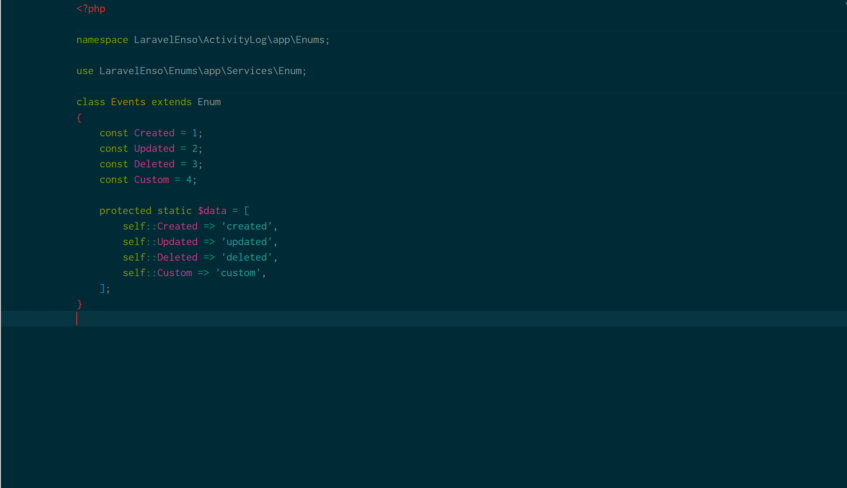Enums
Enum dependency for Laravel Enso.
This package can work independently of the Enso ecosystem.
For live examples and demos, you may visit laravel-enso.com
click on the photo to view a a larger screenshot
Installation
Comes pre-installed in Enso.
To install outside of Enso:
- install the package
composer require laravel-enso/enums
Features
- provides an
Enumclass that can be extended with a local implementation, which will allow you to have enumeration like capabilities - provides an
EnumServiceProviderclass that can be extended with a local implementation - various utility methods are available for the Enum class
- automatic registration of enums within Enso, giving you the option to have the desired enums to the application state, even from within packages
Usage
Enum - LaravelEnso\Enums\app\Services\Enum
Is an abstract class that provides enumeration like capabilities, that is meant to be extended
and may then be used in 3 modes:
a) when given a static 'data' parameter, which should be an associative array
b) when declaring constants on the class
c) when overriding the static attributes() method, which should also return an associative array
Methods:
constants, returns the list of constants defined on the class, or null otherwiseget(key), returns the value of that Enum keyhas(key), returns true if the Enum has that keykeys, returns the list of keys, from the data propertyvalues, returns the list of values, from the data propertyall, returns a translated associative array representation of the enumeration;json, returns a translated json representation of the enumeration;array, returns a translated array representation of the enumeration;object, returns a translated object representation of the enumeration;collection, returns a translated Laravel collection representation of the enumeration;select, returns a translated Enso VueSelect representation of the enumeration - array of objects, each object with theidandnameattribute;
If used in mode a), it will give back the list of constants and their values.
If used in mode b), it will give back the data attribute.
If used in mode c), it will give back the array you build in the overwritten attributes() method
Examples:
Constants
class SeniorityEnum extends Enum
{
const Assistant = 1;
const Associate = 2;
const Staff = 3;
const Senior = 4;
const Partner = 5;
}
...
->where('type', SeniorityEnum::Assistant)
...
...
$seniorityTypes = (new SeniorityEnum())->select();
Data attribute
class SeniorityEnum extends Enum
{
protected static $data = [
1 => 'assistant',
2 => 'associate',
3 => 'staff',
4 => 'senior',
5 => 'partner',
];
}
...
->where('type', SeniorityEnum::get('assistant'))
...
...
$seniorityTypes = (new SeniorityEnum())->select();
Attributes method
class SeniorityEnum extends Enum
{
public static method attributes() {
return Seniority::pluck('id','name')->toArray();
}
}
...
->where('type', SeniorityEnum::get('assistant'))
...
...
$seniorityTypes = (new SeniorityEnum())->select();
Mixed mode
You can actually utilize a mixed mode that may help you in some specific scenarios, such as the one given below. Keep in mind that if you combine the modes, the order in which they are taken into account (the priority) is the following:
$dataattributes()constants
Now, why would you want to mix them? Consider the following scenario:
class SeniorityEnum extends Enum
{
const Assistant = 1;
const Associate = 2;
const Staff = 3;
const Senior = 4;
const BigChief = 5;
protected static $data = [
self::Assistant => 'assistant',
self::Associate => 'associate',
self::Staff => 'staff',
self::Senior => 'senior',
self::BigChief => 'BIG chief',
];
}
...
->where('type', SeniorityEnum::BigChief)
...
...
$seniorityTypes = (new SeniorityEnum())->select();
Here if you only configured the enumeration using constants, it would work, BUT, in the select,
the values would be shown as Assistant,.., BigChief. That's fine if it works for you, but what if
you want to display BIG chief instead of BigChief? You can't.
If you go the other route, and not use constants, but use just data, you can have BIG chief formatted accordingly,
but throughout the code you have to use SeniorityEnum::get('BIG chief') which works, but is error prone.
So the conclusion is you can use both modes and have the best of both worlds.
Contributions
are welcome. Pull requests are great, but issues are good too.
License
This package is released under the MIT license.
← Emails File Manager →
